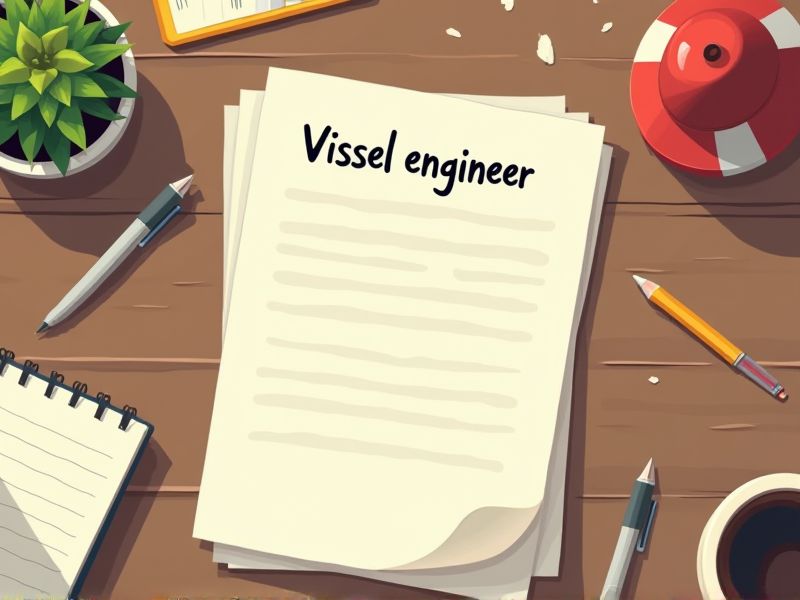
Vessel engineers play a critical role in ensuring the safety and efficiency of maritime operations, requiring specialized knowledge and skills. Certifications serve as verification of an engineer's competency, allowing them to adhere to international maritime regulations and standards. Achieving specific certifications enhances an engineer's ability to handle complex systems and machinery, which is essential for minimizing risks and optimizing vessel performance. Listed below are some important certifications that a vessel engineer may need.
STCW Basic Safety Training Certificate
The STCW Basic Safety Training Certificate ensures that vessel engineers possess essential safety skills, such as fire prevention, first aid, and personal survival techniques, which are critical for maritime operations. Compliance with STCW standards enhances the operational readiness and safety culture onboard, contributing to the overall security of the vessel and its crew. Regulatory authorities mandate this certification to align with international maritime safety protocols and minimize the risk of accidents. Officers and crew members, including vessel engineers, require this certification to meet employment criteria in the global shipping industry.
STCW Advanced Firefighting Certificate
The STCW Advanced Firefighting Certificate ensures vessel engineers are equipped with advanced skills to manage fire emergencies onboard, reducing potential loss and damage. International maritime regulations require engineers to hold this certification, ensuring compliance with safety standards. Firefighting capabilities foster a safer work environment, directly impacting crew safety and vessel integrity. Training enhances engineers' confidence and decision-making abilities during critical fire-related incidents.
STCW Proficiency in Survival Craft and Rescue Boats Certificate
Vessel engineers need the STCW Proficiency in Survival Craft and Rescue Boats Certificate because it equips them with essential skills to handle emergency situations at sea. The training ensures engineers understand the operation and management of survival crafts and rescue boats, which is critical for crew safety and compliance with international maritime regulations. Possessing this certification enhances an engineer's capability to effectively coordinate and participate in rescue operations, augmenting the vessel's overall emergency preparedness. This certification is a prerequisite for maritime roles to ensure adherence to safety standards set by the International Maritime Organization.
Marine Engineer Officer Certification
Marine Engineer Officer Certification ensures that vessel engineers possess the essential technical knowledge and skills required for safe and efficient vessel operation. It verifies compliance with international maritime safety standards that mitigate risks of accidents and enhance crew safety. Certification serves as proof of competence, reassuring shipping companies and regulatory authorities of an engineer's capability to handle complex marine machinery. It fosters career advancement opportunities by setting a recognized benchmark for professional qualifications in the maritime industry.
International Safety Management (ISM) Certification
International Safety Management (ISM) Certification enhances safety procedures for vessel engineers by ensuring compliance with international maritime standards. This certification reduces the risk of accidents and malfunctions, promoting a safer working environment on ships. Global shipping operations require ISM Certification to maintain standardization, facilitating better communication and procedures among international crews. In the event of an accident, having ISM Certification often results in more efficient incident management and increased accountability.
MARPOL Pollution Prevention Training Certificate
The MARPOL Pollution Prevention Training Certificate ensures vessel engineers understand international regulations aimed at preventing marine pollution. Without this certification, engineers may not have the necessary knowledge to implement effective measures against oil, chemical, and other pollutants. Compliance with MARPOL reduces the risk of environmental damage, which can result in significant legal penalties for the vessel owner. The training empowers engineers to contribute directly to sustainable marine operations, aligning with global environmental goals.
Dynamic Positioning (DP) Operator Certificate
A Dynamic Positioning (DP) Operator Certificate is needed for a vessel engineer to ensure safe and precise vessel navigation, especially in offshore environments. This certification verifies the engineer's capability to manage the DP control systems that maintain a ship's position automatically. Accurate positioning is crucial for operations like drilling, cable laying, or subsea construction where environmental challenges can pose significant risks. The certification also aligns with industry regulations and standards, enhancing the vessel's operational safety and efficiency.
Engine Room Watchkeeping Certificate
Obtaining an Engine Room Watchkeeping Certificate ensures that a vessel engineer possesses the necessary skills and knowledge to monitor engine operations effectively. This certification minimizes the risk of machinery failure by ensuring readiness for identifying and addressing engine-related issues. Regulations require the certificate to comply with international maritime safety standards, thus promoting the safe operation of the vessel. It gives vessel engineers credibility and trust, enhancing their professional standing in the maritime industry.
Marine Machinery Maintenance and Troubleshooting Certification
Marine Machinery Maintenance and Troubleshooting Certification equips vessel engineers with the skills needed to effectively identify and resolve mechanical issues, preventing costly equipment downtime. Engineers with this certification demonstrate adherence to industry standards, ensuring safer and more efficient vessel operations. The certification provides a structured approach to maintenance, reducing the likelihood of unexpected failures and enhancing vessel reliability. Regulatory bodies often require certified engineers, aligning vessel operations with legal and environmental compliance.
ISO 9001 Quality Management Systems Certification
Obtaining ISO 9001 certification helps vessel engineers align their operations with international quality standards, improving consistency in project outcomes. It assists in streamlining processes, which often results in reduced operational inefficiencies and cost savings. The certificate also enhances reputation, potentially leading to increased trust from clients and stakeholders due to the demonstrated commitment to quality management. Consistent application of ISO 9001 standards can improve safety and compliance, reducing the risk of costly errors or accidents on vessels.
Summary
When you earn certifications as a vessel engineer, your qualifications in the marine industry become more recognized. Increased recognition can lead to better job opportunities and potentially higher salaries. Gaining certifications often enhances your technical skills and expertise, improving your work efficiency and problem-solving capabilities. It typically fosters professional growth and positions you as a more competitive candidate in the job market.
